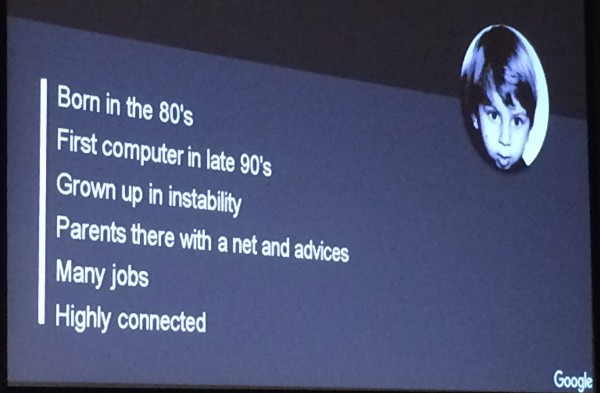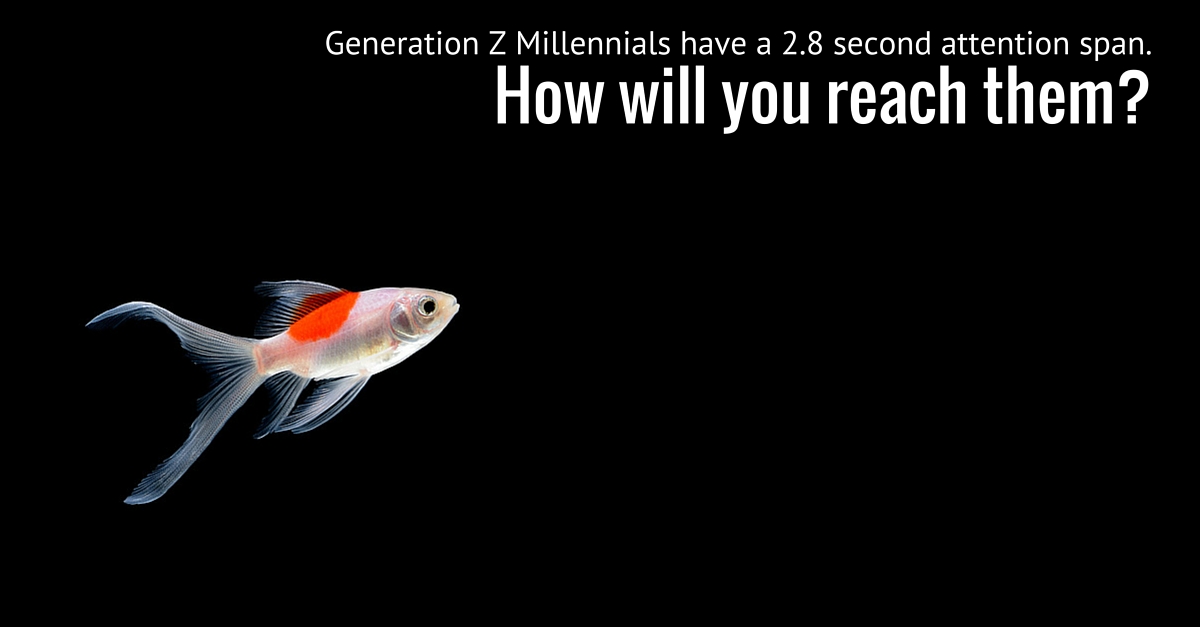Millennial Expectations and Search Behavior Trends with Google’s Gary Illyes was originally published on BruceClay.com, home of expert search engine optimization tips.
Getting to know millennials has been a hot topic at Pubcon Las Vegas 2015. Everyone’s talking about millennials, including Google’s Gary Illyes (who’s a millennial himself!). He took the stage to deliver the grand finale keynote, and he’s going to tell us how Google is thinking about millennials and how they’re shaping the future of search.
Generation Y and Z Millennials
 Generation Y Fast Facts
Generation Y Fast Facts
- Born between 1980 and 2000
- Grew up with changing technology quite educated
- Always connected
- Social
- Firsthand experience with instability
(Illyes is part of this generation.)
These people are:
- Egocentric
- Independent
- Confident
- Open to change
- Needy
- Impatient
- Have a short attention span
You can learn everything about them. All their information is on Instagram, Facebook, etc. They love selfies, even though they are not the “selfie generation.”
- 46% of millennials are interested in starting and running a small biz
- 35% of employees mill have started their own business on the side to comp their income
- 2/3 of them want to created a positive impact on their local communities
- 40% believe they are capable of global impact
In 2000 the average attention span was 10 seconds. In 2013 it was 8 seconds. How long is the attention span of today’s Generation Z? Read on.
Generation Z Fast Facts
- Born between 1995 and now
- Born into a crisis period
- Highly educated
- Highly connected
- Less “social”
This is the selfie generation. They, too are egocentric. They are also:
- Independent
- Open to change
- Needy
- Impatient
- Short attention spans (an estimated 2.8 seconds)
Connecting with Generations Y and Z
These two generations are very similar. They will abandon your site without thought if you don’t provide the information they’re looking (and they know precisely what they’re looking for), they will leave. If you don’t pay attention to their unique personalities, they will leave your site. If your site loads too slowly, they will leave your site.
Google cares very much about the user. And Google wants to fulfill all their expectations. These are search features and updates they’ve launched to move forward Google’s ability to serve users:
- The mobile-friendly update
- Google Now (an assistant that needs more work and requires input from the user), app indexing
- Now on Tap (on Android, if you’re inside an app, you can long-press the home button and get info on the context from within the app)
- voice search (you can ask a succession of questions and each following query builds on top of the previous context)
- Accelerated Mobile Pages (AMP, just launched yesterday)
Many more launches to help the users are coming.
Search is becoming location aware. If you’re in front of a restaurant and you ask your phone “What are the opening times?” Google will answer, knowing which restaurant you’re in front of. Google’s goal is to build the personal assistant (think of the movie “Her” but less creepy).
Here’s a practical tip for making your content useful for this audience. Use callouts or bubbles: put part of a sentence that answers the specific question that got your user to that page. Users don’t read whole articles anymore (remember their abbreviated attention span?). Users need quick bite size information on the page they consume really fast. If you can also add the question, that is great, too.
If your site doesn’t load in 2.8 seconds (the length of Gen Z’s attention span) then Gen Z will leave your site.
Make users feel special and make their life easier. Something like autocompleting their info on your forms is going to stick with them as something awesome about you that they want to come back for.
Dos:
- Create original content with care – shocking?!
- Make sure users find the info fast – it should be easy to find with a quick scroll
- Have bite-sized info where possible – or at least highlight important parts of content
- Leave your community up – don’t remove comments, forums, UGC, but do moderate. UGC is great for your site unless it’s spammy or low quality
Don’t:
- Construct your pages for search – a page that’s not designed for users will hurt you most with your users because they won’t like it, hit back and leave you
- Optimize for information you don’t have
- Send all your visitors to other sites – this refers to affiliate sites
- Rely solely on widely available data – you’re not the first to think of aggregating lyrics or list all the phone numbers. If you’re in that business, you have to provide more.
How many of you ask this question at the end of the day: how many visitors have I had today? That’s the wrong question. You want to ask: How many visitors did I help today?
Q&A with Gary Illyes
Question: Is it important to remove thin content for the Panda penalty?
Panda isn’t a penalty. Removing thin content will just decrease your ranking even more. You want to overwhelm the site with thick content to satisfy users’ desire for information. If you have poor content and spammy UGC, feel free to remove it. Spending time assessing what’s thin content on your site, instead spend it creating rich content users will love.
Question: What’s going on with the local pack’s constantly fluctuating state?
They’re trying to remove stuff users don’t interact with. You may see lots of experiments where a feature or component on the SERP one day and not the next, that’s a “one-percent experiment.”
Question: Google is good at understanding keyword intent. Why can’t Google get good at resolving NAP consistency issues for local SEO?
Gary says it’s good feedback and a good idea he’ll bring back to the team.
Question: Negative SEO campaigns – are they effective and what’s Google doing to get rid of them?
He’s looked at a dozen supposed negative seo cases and he didn’t see one that was actually a problem with negative SEO. It was always something else. If you see something weird, put it in a disavow file.
Question: Any Search Console changes we should look out for?
We are working on updating the indexes feature. Index data more accurate, more useful, and probably also more examples of what URLs Google has indexed. Other than that they’re also looking at bringing rich snippets into analytics data. And want to figure out how to present the numbers because they can be very twisted. It’s quarters away.
Question: An update on referrer spam in analytics?
No. He doesn’t work in analytics. The analytics team knows about it and is working on it.
Question: Scraped content – how much of a problem is it for the original website?
Gary thinks they do pretty good determining the content creator and serving that version over scrapers. Sometimes it doesn’t work. If you are outranked by a scraper, in most cases there’s something holding back your site.
Question: There used to be monthly webmaster updates and the search community loved it. Why not start that back up?
People were literally dissecting every single world and coming up with theories of how it affected their rankings and it had no effect. People were focusing on things that they shouldn’t. Search is not that complicated. There are a few basic rules that if you follow then you will rank pretty well. People liked the updates but we also got way more questions and the overall quality of pages in the U.S. declined several points and when we stopped those updates, the quality climbed back up. You are SEOs. You are doing a great job promoting content. Concentrate on that.
Editor’s Addendum: Millenials in Context
Back at the BCI offices, Pubcon livebloggers Kristi Kellogg and Virginia Nussey came across this SNL skit emphasizing some of the Millenial characteristics Illyes describes. It may add some context to the conversation. Or just a chuckle. 



No comments:
Post a Comment